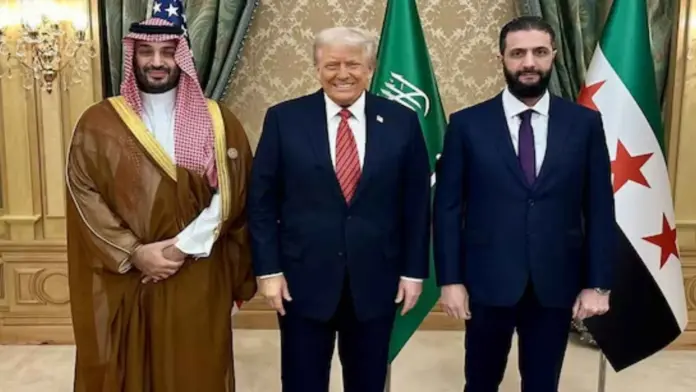This tour of former US President Donald Trump was meant to lead him through some of the most significant countries in the Middle East regarding economics and diplomacy. The core of his tour focused on establishing multi-billion-dollar trade deals with Saudi Arabia, Qatar, and the UAE. These agreements, which amounted to a sum of over $2 trillion, included all sectors, from defense to aviation, covering infrastructure and artificial intelligence.
With this, the agreements are of a great strategic nature, marking a new orientation of economic diplomacy. The visit tries to emphasize America’s commitment to defining commerce-based international relations affecting global alliances. Most importantly, on technological partnerships, Turkey-Russia ties will solidify into economic alliances across sectors.
Economic Agreement Highlights
Saudi Investment Commitments
Saudi Arabia pledged $600 billion to U.S. industries, targeting particularly defense and artificial intelligence. The continent’s significant agreement, estimated at $142 billion, commits to high-end military purchases. Saudi company DataVolt pledged a commitment of $20 billion towards energy solutions using artificial intelligence to deepen this technological engagement.
This partnership fosters a groundbreaking U.S.-Saudi trade channel. The partnership also stimulates aspiration for the digital transformation and encourages this bilateral economic growth. Thus, both countries stand to benefit from increased trade chances.
Also read: ‘Dilbert’ Creator Scott Adams Reveals Same Cancer Diagnosis As Biden
Qatar’s Defense and Trade Deals
The $243.5 billion in defense and trade accords completed by Qatar established a $1.2 trillion bilateral trade framework. Qatar Airways’ $96 billion Boeing aircraft purchase secures 154,000 American jobs each year.
Moreover, Qatar promised $10 billion to modernize a strategic U.S. military base, which further fortifies security ties. Another $42 billion in arms purchases will add to Qatar’s defense, ensuring stability in the region. Overall, Qatar’s investments stem from its long-term economic vision.
UAE Investments in Aviation and AI
Investment in US Projects by the UAE: $200 billion for aviation, defense, and artificial intelligence-focused projects. Etihad Airways secured a $14.5 billion sale of Boeing aircraft, although towards the US manufacturing base.
According to this report, the UAE also opened the largest AI Data Center outside the US in Abu Dhabi. This is expected to drive advanced studies in cybersecurity towards enabling global AI governance. Such ways will hold these deals closer together and stronger in technological unity.
Strategic Political Implications
Trump’s visit marks a shift regarding how diplomatic policy is carried out: rather than relying on ideological relationships, it shifts to negotiations primarily based on economics. It emphasizes the export of technologies and investments in infrastructure to ensure long-term, durable collaboration in the region.
U.S. sanctions against Syria were also rescinded by Trump. His conversation with Syrian President Ahmed al-Sharaa sparked an unprecedented global debate on regional balance and economic reintegration into the region. It is a highly controversial step that can redefine the diplomatic setting of the Middle East.
His engagements also bolstered AI and cybersecurity ties within a framework of digital sovereignty. So it is believed that this kind of cooperation will ignite innovation and rewrite the world’s trade policies.
Long-Term Economic Repercussions
The $2 trillion investment deals will more effectively impact US-Middle East relations: stronger defense and AI technology partnerships will consolidate these agreements, which further entrench cooperation in commerce, infrastructure, and security sectors, setting the course for global trade dynamics in the future.
In addition, the jobs that arise from the investments become the foundation for future stability in trade. Gulf states are establishing digital economies, and their commitment to innovation produces long-term economic benefits. Hence, the deals will have implications on the technology front, promoting AI-enabled collaborations.
The agreements are expected to boost U.S. exports through an increased production capacity in the aerospace, defense, and energy sectors. If executed successfully, it will elevate America to the forefront of high-tech innovations while making it the beacon of worldwide trade.
Defining Global Trade: The Strategic Impact of Trump’s Middle East Visit
Trump travels to the Middle East to promote America’s economic presence throughout the region while pursuing certain strategic trade alliances. Contracts, issued within the $2 trillion investment deals, thus become the diplomatic discussion phase of the future based on technology, infrastructure, and security partnerships.
Although some agreements were criticized, they nevertheless highlighted the increasing interdependence of economies across the globe. His visit built ties between the USA and the Middle East through long-term investments, creating new common ground. Finally, such agreements define world trade practices regarding future encounters of a diplomatic nature.








